The Wounds We Carry: Help from Pema Chodron’s Tonglen Practice
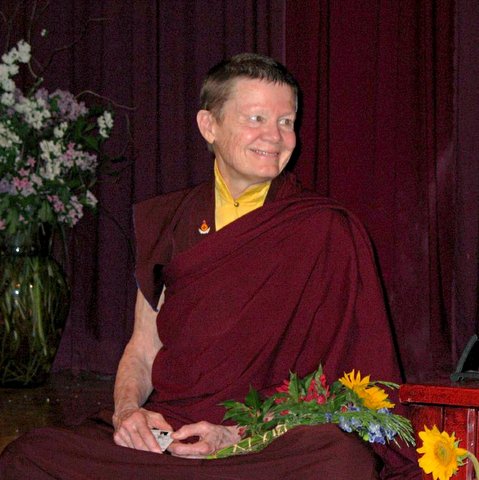
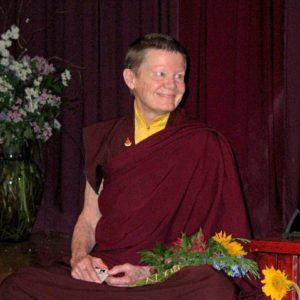
“They’re all wounded,” I thought as I watched people in the grocery store or on the street, “but I can’t see their scars and they can’t see mine.”
While anxiously awaiting my husband Vic’s cancer diagnosis in 2006, I walked through the produce area of the grocery store and watched serious and downtrodden faces. I noticed people in wheel-chair carts and others leaning into a push cart for support. I noticed faces without eyebrows and bald scarf-covered heads that shouted chemotherapy. I noticed those who were irritable, moving impatiently through beautiful heaps of late summer corn and cantaloupes, seeing nothing except the old person in front of them slowing their progress. I watched tight jaws that seemed on the verge of tears. Some people averted their eyes, unwilling to exchange even a glance or smile.

It became my practice to watch and wish others well as I wished myself and Vic well, a simple version of the tonglen practice taught by Pema Chodron and other Tibetan Buddhists. It helped in the chemotherapy room where the wounds were obvious—severely thin people with bald heads, sallow skin, and dark circles. Sad people, often alone, distracting themselves from this alarming land of cancer treatment. I wished them happiness because I knew their life hurt as mine did, even if we were the lucky ones who had food to eat, a place to sleep, and medical treatment.
Agonizing over Vic’s illness spurred me into this practice of taking in the difficulty of others and wishing them well while feeling my own unhappiness, worry, impatience, or anxiety and wishing myself well, too. I did lots of deep breathing, breathing in the unhappiness and breathing out solace and comfort.
Pema Chodron speaks of it this way: “I particularly like to encourage tonglen on the spot. For example, you’re walking down the street and you see the pain of another human being. On-the-spot tonglen means that you don’t just rush by; you actually breathe in with the wish that this person could be free of suffering, and send them out some kind of good heart or well-being. If seeing that other person’s pain brings up your fear or anger or confusion, which often happens, just start doing tonglen for yourself and all the other people who are stuck in the very same way.”
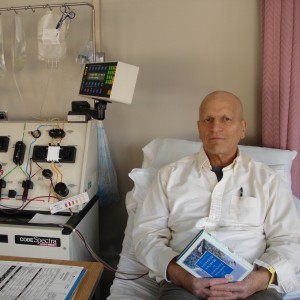
I remembered that I was not alone, that everyone struggled and felt disappointment, fear, illness, or pain. Vic was good at noticing the suffering around him and he became my teacher, too.
Now, I watch my 97-year-old mother-in-law grow more and more angry. I know she is eaten alive by undigested grief after the loss of her only son. Her grief has hardened into a wall of rage so she can no longer see or feel that others hurt, too.
She wants something I can’t give her—her son. I want him, too, so I try to learn from her. Breathing in the misery she feels and the misery I feel in her presence, breathing out comfort to both of us and being careful with my words when I want to snap and scold. This practice helps me with the guilt I feel about my own aversion and anger. It helps me stay with her when I’d rather run. All I can do is practice.
***
What practices help you through the hard times? You might enjoy Befriending Myself: Rescued by Pema Chodron. For other posts about grief and cancer treatment, see Betrayal of the Body: The Secret Life of Cancer or Speeding to Strong Cancer Center.

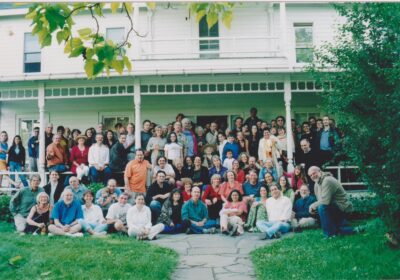
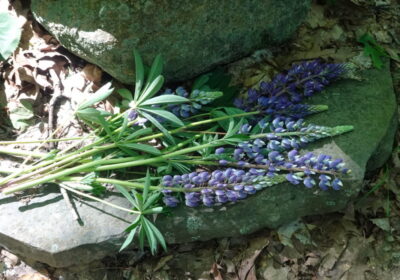
January 24, 2019 at 10:19 am
maggi deimel
Thank you Elaine. Do you know, I didn’t expect you to reply to the last entry! Yet again I read it just now – Jan 24th. I felt I had been treating you like an agony aunt which didn’t seem fair. And in fact the party was a good experience – just chatting quietly to old friends.
Yes, I think you are right – breathing in blessing as well as out is probably the way to go at the moment. I like what you say about grief suddenly smacking you over the head or in the heart. On and on. And am intrigued that you perceive what I say as showing a tendency to berate myself for weaknesses. Having mercy on myself is a good notion. I have been dipping into “Start Where you Are” again and am surprised to see Tong len described many times in different ways, one being to be holding the hurting parts of ourselves as we hold a baby, soothing it. Something to put alongside the breathing in blessing when the pain is too great (usually first thing in the morning!)
Thank you for this blog. It is another plank in my infrastructure.
January 24, 2019 at 12:38 pm
Elaine Mansfield
No problem in telling me your experience. I’m glad it was fine. I use those loving tonglen variations as a way to hold myself in mercy. I wrote about it in this piece. “Befriending Myself.” https://elainemansfield.com/2013/befriending-myself-rescued-by-pema-chodron/
Some teachers have rigid explanations about tonglen practice. I relate more to Pema Chodron’s approach which makes the practice integral to life. A similar practice for me is imagining myself in the arms of the Great Mother who holds me like a suffering child. I trust you’ll find what works for you. And I trust you’ll find ways to make a new life for yourself–one plank in that infrastructure at a time. Sometimes they’re hard to keep in place. Sending love and self-compassion.
January 2, 2019 at 10:23 am
maggi
Dear Elaine thank you. Again, have just read your response. Today is a bad day, just don’t know why. Maybe because I am going to the first actual party tonight without Richard. The shift I referred to in my last seems to have vanished though that doesn’t mean it hasn’t happened. I had a strong sense over Christmas of my own life starting to take shape as I realised that I can give more energy to helping others, specifically by visiting the lonely.I have done a lot of that in the past and the very thought gave me strength. But again, that has gone and I am metaphorically back on the floor. It is so exhausting! Sorry to be such a whinger. The New Year started well, meditating through the midnight hour with a friend, followed by a sunrise walk into the hills. So that is a good memory. I will leave you in peace now. Thank you for being there. And as for Tonglen I realised today that as I am breathing in pain all the time all I have to think of is breathing out a bit of blessing sometimes.
January 4, 2019 at 9:49 am
Elaine Mansfield
Dear Maggi, first and most important, you are not a whiner. Grief is not linear. It seems to recede and then comes along and smacks you over the head or in the heart. Holidays are hard with forced cheerfulness surrounding us everywhere. So maybe the best thing is to breathe in and breathe out a sense of blessing and also self-cherishing. I’m good at pounding on myself for perceived weaknesses and failures, and it sounds like you’re doing that, too, at the very moment when you need patience and tenderness and comfort. For me, this was time to head for the forest to lean into a big tree or to call a trusted friend and tell her/him the truth about my struggles. A time to soothe our pain. I don’t know what you should do or what works best for you–nature, music, an art project, a massage, tea with a friend–but I hope you can love yourself and have mercy on the part of you that is suffering. Sending blessings to you.
September 19, 2018 at 3:28 pm
Maggi Deimel
Dear Elaine I am fairly clueless about techy stuff so when your answer didn’t appear on my e.mail I didn’t think to get back on this thread until just now! ( My first response must have been on a day when the lap top was open a long time.) Thank you so much for it, 6 months later. It does feel as though some shift is happening, though it is so recent that I am wary of trying to describe it. But I will do so when it feels it has struck root. in the meantime, thank you for your work and your generosity – you are helping many of us.
September 20, 2018 at 10:28 am
Elaine Mansfield
I’m glad you got my response, Maggi. Sometimes we need to receive these things when we actually get them–not when we expect them. Thanks for your kind words.
March 12, 2018 at 4:57 pm
maggi deimel
Dear Elaine
Thank you so much for your response. Today has been one of the worst days so your words are real gift as this day draws to a close. ( And this is the first time I have ever joined in such a thread!) The most comforting thing is hearing that working through the most exhausting and raw parts of grief took you a few years. I know that the process is “supposed” to take up to 5 years but I thought the raw intensity would have died down a little by now, rather than just changing its character. It may seem odd that hearing you say that is a comfort but it is so. It means I am not in a worse state than someone else, who clearly has the mature and loving spirit that you have, has been. I do have lots of friends with whom I share meals, tea etc.and the women from “our” spirituality group have set up a rota which means that 3 times a week one of them stays over with me ( it was every other day at first but I felt the need to wean myself off this gradually.) And I am seeing a psychotherapist who is very helpful.But some days nothing is happening, and sometimes that is fine, indeed good, but sometimes the emptiness seems overwhelming. His presence had a strong sweetness which is so hard to live without, although as you imply there are ways in which it is even stronger now. But not always! I will take your advice and make myself go on longer walks – we live in a beautiful part of the world (the North Pennines)- so there are lovely places to go to from my doorstep. And, yes, write to Pema Chodron. I love the idea of sharing a cup of tea with you – even the image is delightful! Thank you again.
March 13, 2018 at 10:12 am
Elaine Mansfield
Maggi, I’m glad to know you have a strong support system and a spiritual group. These things help as much as anything helps. After Vic’s death, I thought grief would be manageable for me. After all, I’d had two years to get used to the idea that Vic would die, I had a strong spiritual and meditation practice for over 35 years, and I’d done years of psychological work in therapy, in groups, with Vic, and on my own. Grief still consumed me in ways. I realized there was no way to prepare for this. I had to live it. I love ancient mythology, so I saw it as an initiatory journey to the Underworld or the Great Below. The ego has no place to stand in those realms.
If we love someone dearly, I don’t think we can avoid grieving the emptiness and absence after their death. I experienced a slow shift to inner connection with less focus on the outer absence, but I still miss my husband every day and, some days, grief blows in like a storm and takes over. I miss his laughter and hugs, sharing dreams and walks, our deep and honest conversations. It’s not the same without his body, but I’m amazed at how his inner presence persists after almost 10 years. It doesn’t limit me, as I’ve said, but feels like a strong support. I’ve been seen for who I am and I’ve been loved with a love that remains. Blessings to you, Maggi. I hope you can take grieving self in your arms and give her lots of support.
March 12, 2018 at 10:50 am
maggi deimel
I am really interested in all this. I practised Tong len a little in 2016-2017 and found it amazingly helpful – it really did open my heart to others in a way not felt before. Then my beloved husband died very suddenly and unexpectedly in July 2018.. At first, meditation helped a bit but Tong len itself, though I tried it, was and still is really painful. So much so that when I try it I often end up in worse pain than before I started – and this continues for a long time. Do you have any advice? I really don’t want to waste this grief, I feel I have been called to something worthwhile – but today for the first time I felt I hated God for letting me be so unhappy. And this after leading one of the monthly spirituality sessions we set up in our house! ( I did have a 5 month break from them but in December it felt right to start again and they have been a huge source of comfort.)
March 12, 2018 at 1:57 pm
Elaine Mansfield
Dear Maggie, my heart breaks for you. Did your husband die in July 2017? I assume that, so it hasn’t even been a year. Let’s begin with the fact that I’m not a meditation teacher. I can say as a friend that tonglen sounds like the wrong practice at this time. It’s a lot to hold just your own grief without adding the grief and suffering of the world. In the first years after my husband’s death, walking meditation was the best medicine for me. Long walks on foot or snowshoes, paying attention to nature. Saying mantra in the rhythm of my steps. A favorite was “Mother help me. Mother hold me.” I felt the Divine Feminine Mother everywhere in Nature, so this was natural for me. I needed to feel myself held in loving arms. Of course, I don’t know what you should do. Perhaps talk to a meditation teacher you trust? I would even write Pema Chodron a letter asking for her advice. I imagine someone there will read it and you’ll get a response–either through the mail or a response from within. Anger is natural, especially in a sudden death. That part of you needs soothing, not scolding.
For me, it wasn’t possible to do a focused meditation or put my mind on supporting others right away. That came a few years later after I had worked through the rawest and most exhausting parts of grief. There are many kinds of meditation. Gardening was another important practice for me and it felt like a meditation to put my hands in the soil and nurture life. I’ll end by saying I don’t think you can “waste this grief.” It’s bigger than we are and brings transformations and a sense of initiation, but it can also knock us off our feet. Perhaps you need more holding and tenderness in your life. I imagine you receiving a massage from a spiritually attuned woman or spending more time listening to music or having tea with a friend or hospice counselor (hospice bereavement support is usually available to people who grieve for someone who was not a hospice patient). I envision you nurturing and feeding yourself as you walk through this pain. The sharp edges soften in time, but you’ll still have the heart connection with your husband. I send you love. I wish I could share a cup of tea with you.
October 2, 2017 at 6:52 am
susan scott
I read your post yesterday Elaine and before I got onto my computer just now, I was thinking about Tonglen and the necessity of practice, practice, practice. Now I have just re-read your post and that is exactly what you say. And in a return comment to someone you say maybe the whole world needs to practice this. I’ve wondered many times about the anonymity of pain.
Tonglen first came to my attention a few months ago when an Internet friend and intermittent blogger Beth put up a post about sitting under a tree that was not well, and breathing in its sickness and breathing it out and wishing it well. I know that we can do this and extrapolate to all sentient beings which is everything and every one … and for ourselves as well. I remember from a long long time ago about the value of not wishing ill thoughts on anyone and just sending them love if only for a second when those negative feelings come up vis a vis another … which is not to deny the actual feelings –
‘…it’s wise to look and open the heart rather than avert our eyes and pretend it isn’t there.’ Your words – open the heart – by doung for others you do for yourself. I still don’t know which came first, the chicken or the egg.
Thank you for this beautiful post from September 2013 Elaine … I will start to practice. Just this morning walking along the beach (I arrived yesterday even though I had been here for a week just very recently) people smiled and said hello and how nice that was, and a little later when I was doing a little bit of shopping a lovely woman came out and literally beamed at me.
And very importantly, you say that we can do Tonglen for ourselves … I’m also reminded of my late mother who was a yoga teacher and her breathing/relaxation exercises was a form of Tonglen and which was very healing.
Practice – thank you.
October 2, 2017 at 10:02 am
Elaine Mansfield
Susan, I love your reply full of practical ideas and your implementation details. If we think through the lens of tonglen, it’s easy to practice this throughout the day especially when we see or feel suffering. Some people talk about this sort of heart work as creating an energy field that effects everything and everyone, including ourselves. I agree about yoga, and deep breathing, and practicing on the beach. Our oceans and the creatures in them need our loving kindness, too. The world starves for kindness, so we offer what we can. It becomes a habit for me, especially helpful when I find myself pulling back from someone who is suffering from illness and old age. I tend to quickly reject the part of me that struggles and dismiss my own suffering. There’s room for all under the tonglen tent.
October 2, 2017 at 1:00 pm
susan scott
thank you 🙂
September 18, 2013 at 4:45 pm
Robin Botie
This reminds me of when I was a kid riding along in the back seat of my mother’s car. I would see sad or poor people on the street or a run-down house and send “blessings” out to those who needed help. And now, as an adult who has experienced pain and loss, I should be able to adopt this beautiful practice of tonglen. Thank you for sharing this, Elaine.
September 18, 2013 at 8:38 pm
Elaine Mansfield
Robin, I think we’ve both been cracked open enough to understand how essential this practice is. It helps me transform my own sorrow.
September 15, 2013 at 11:05 pm
Ann N
Vic’s mom is very fortunate to have such a kind and loving daughter-in-law. You are truly a blessing to her and to all of us whose lives you have deeply touched with your compassion as well as your beautiful words. xo
September 16, 2013 at 8:00 am
Elaine Mansfield
Thank you, Ann. Of course, to Vic’s mom, I’m the booby prize. She wants her son, and I don’t blame her. But somehow we have to make peace with our situation because I’m the one who will accompany her to her death. I hope her anger will soften. I hope my reactions to it will ease. And on we’ll go, somehow getting through the rough spots, learning our lessons, and developing new inner strengths. Thank you for all you’ve shown me about compassion and all you do to support the elderly–and me.
September 14, 2013 at 4:01 pm
Sharyn Duncan
I can’t say that I went through much anger- nor did Tim. I did blame myself- and had to forgive myself, though on the surface of it that’s ridiculous. I guess I thought that since I was her mother I should have been able to protect/save her. We find so many ways to be cruel to ourselves. Control is such a powerful illusion!
As for Virginia- she reminds me of so many of the older Catholic ladies in one of our support groups, all of whom felt they had been sold a bill of goods. Bad things happening to good people. They went to Mass every day- so how could this happen? But she sounds practically unreachable. Don’t try to do more than you can for her. My mother was a black hole emotionally & I had to protect myself around her. I’m glad Virginia likes Willow- dogs are so accepting. Do the boys try to see her when they’re here? You could hardly blame them if they didn’t. Maybe prayer from a distance….
September 14, 2013 at 4:39 pm
Elaine Mansfield
David and Anthony are terrific with their grandma, but they have limits when she hangs up phones or rage at them. They call her most weeks and spend time with her when they’re here. It’s so sad to be stuck in grief. Another of Virginia’s friends called me today to join the lament about her anger and unhappiness. I get lots of “God Bless Yous” from her old friends and her sister. She wasn’t so strongly Catholic, really. Just felt that she didn’t deserve to get what she got. None of us do, but some of us find a way to turn our grief into service and support for others. But we have to be willing to experience our deep pain. My mother wasn’t willing when my dad died–she became emotionally frozen, expressing no feeling at all and not discussing my dad until she became senile 40 years later. Then all that grief was waiting for her. Virginia might soften in time, but she’s 97, so doesn’t have much time left. Thank you, Sharyn. I know you have worked so hard to carry and transform your unbearable loss.
September 12, 2013 at 11:51 am
Sharyn Duncan
I feel for Vic’s mom. Of all the so-called stages of grief, anger is the one we most commonly get stuck in. And of course, anger is a secondary feeling, covering other , more difficult – and especially for men- less socially acceptable reactions to overwhelming pain. I wonder if it would help her if you breathed with her, bringing your breaths into synchronization with hers, maybe silently sighing on the out-breath. When our daughter died, a very wise person, several years ahead of us on this road, told us there was no way over, under, or around this pain- only through it. Such hard work. The hardest work we’ll ever know, and not work of our own choosing. It can feel like there is no change- but if you look behind you on this uncharted wasteland, you can see your own footprints extending out behind you- a sign that there is at least movement. And a straw to grasp. I have found the lovingkindness meditation so helpful- both for myself and extending it to others- like you in the grocery store. We never know what burdens others are carrying, do we? xox
September 12, 2013 at 2:14 pm
Elaine Mansfield
Thanks for your thoughtful response, Sharyn. Since I work in bereavement at Hospice, I know about anger and grief, although that wasn’t a primary response for me. I wept, wrote, and got lots of help. Vic’s mom raged. I tried to help her, but she refused to speak to her priest when he contacted her, hospice counselors (who contacted her before I was involved with hospice), or anyone else. She was and is angry at her God and at me. She never admitted that Vic could die, even though we moved her from FL to Ithaca so that we could care for her while he was ill and I could carry on when he was gone. We were honest about his situation and tried to include her. Although she lived nearby during his last year, she refused to see him when he was in rough shape and wouldn’t see him at all the last two months, other than one 45 minute exception on Mother’s Day when I begged, she relented, and we took her out for lunch. She spent that last precious hour with Vic scolding because he couldn’t eat. Then she refused to see him again. I called her every day to tell her what was happening and to try to persuade her to see him.
I’ve talked to social workers in the senior housing residence where she lives and a few counselors on the bereavement team at Hospice. I don’t think it’s possible to change Virginia. Fortunately, she likes my dog, so I leave Willow at her apartment 2-3 times a week. The situation has been stuck for over 5 years. I keep working on softening my heart toward her combined with self-protection. Trying to talk with her about this is like poking a stick in a hornet’s nest. I know she is suffering, but there doesn’t seem to be much I can do other than stick with her even when I want to run. I do lots of conscious breathing in her presence, so thanks for reinforcing that and suggesting coordinating with her breath. Life is messy. She teaches me a lot about myself. Thanks again.
September 18, 2013 at 4:35 pm
Robin Botie
It’s wonderful that you leave your mother-in-law Willow. The soft warmth of Willow must give her some comfort. I’m sure lending Willow is like giving her a gift.
September 18, 2013 at 4:41 pm
Elaine Mansfield
It is, Robin. One of the few things I offer that she truly loves. Glad for her sake and mine.
September 11, 2013 at 8:13 pm
Gail Birnbaum
When my dear younger brother was dying of cancer (he was only 41 years old), I too clung to Pema Chodron’s practice. I had her audio tapes, “Awakening to Compassion” which I listened to incessently in my car and during my lunch breaks at Snow Lion Publications. It helped me immensely. Her calm voice was soothing, her humor was a welcome relief from my profound grief. I default to this practice automatically now. I also say, “there by the grace of God go I” when I am too repelled by a passing person who is suffering. Thank you so much for sharing, Elaine.
September 11, 2013 at 9:41 pm
Elaine Mansfield
What a wonderful example of how to use this exercise, Gail. such a difficult experience for you and your family, but it sounds like the practice made it a little more tolerable. After Vic died, I listened to Pema Chodron tapes in the car–sometimes the same one over and over. The most important for me was “Don’t Bite the Hook,” and of course with Vic’s mom, I bite the hook all too often. Pema Chodron challenges me to put my ideals into practice.
Thanks for taking time to read my piece and respond to it. And thank you for sharing, too.
September 11, 2013 at 8:07 pm
Kathleen M. Rodgers
Elaine – What a kind, empathetic person you are. After reading your essay, I will never enter another grocery store without noticing the invisible scars of others. I will try to be aware of the person in front of me, beside me, behind me. I will pay attention.
“I know she is eaten alive by undigested grief after the loss of her only son.” I like how you use the word “undigested” in this sentence. It speaks about a grief that is almost too hard to fully acknowledge. I don’t even want to know your mother-in-law’s deep pain, a pain my own mother knows all too well as she has also lost a son. And my maternal grandmother before her.
I keep scrolling back up to study the photo of Vic as he undergoes a stem cell transplant. I notice he is wearing a dress shirt with a pen in his pocket, and that he is very handsome.
September 11, 2013 at 9:36 pm
Elaine Mansfield
You notice so much, Kathleen. Vic wore a certain “uniform.” Jeans or, when he was sick and in bed a lot, thick knit cargo pants, a cotton colored T shirt, and in winter, an “Oxford” cotton long-sleeved button-down–had to be button down–shirt. Always a pen in the pocket. A writer. And after he stained the pocket with ink, his shirts became my “boyfriend shirts” to wear for sun protection in the garden and bug protection for walks. I gave away most of his shirts, but kept a few for gardening shirts. I wear them still. He was tense about the stem cell transplant, and that shows in his face.
I feel for Vic’s mom, too, but anger pushes people who care for you away, no matter what the reason for that anger. Of course, it’s a defense against what can’t be swallowed–but I know others who have loss of a child and they weep with their families and bring everyone close together.
Pema Chodron teaches a great exercise, doesn’t she? We can do it anytime, especially if we’re irritable about waiting in line or being in an uncomfortable place. Just look around and know that others struggle, too.
I re-read “She’s Come Undone Tonight” and the story about the loss of your brother. Both excellent.
Warmly, Elaine
September 11, 2013 at 1:31 pm
Lynne Taetzsch
Elaine, thanks for sharing your experience with tonglen. I know I need more of it in my own life.
Lynne
September 11, 2013 at 2:36 pm
Elaine Mansfield
I think the whole world needs this practice, Lynne. Along with the sadness of Vic’s illness, there was the opportunity to learn this in my own way. And there are always challenges! And I often fail. But I keep returning to the practice because it’s the best option I know.
September 11, 2013 at 9:26 am
Kay Marie
This little sign was very much what I needed this moment. “Pema Chodron speaks of it this way: “I particularly like to encourage tonglen on the spot. For example, you’re walking down the street and you see the pain of another human being. On-the-spot tonglen means that you don’t just rush by; you actually breathe in with the wish that this person could be free of suffering, and send them out some kind of good heart or well-being. If seeing that other person’s pain brings up your fear or anger or confusion, which often happens, just start doing tonglen for yourself and all the other people who are stuck in the very same way.” I must remember to simply breathe. Thank you my sweet wise woman <3
September 11, 2013 at 10:33 am
Elaine Mansfield
I was driven to this practice by the sense of drowning in Vic’s suffering. As you know too well, Kay Marie, when the suffering of others is in your face in a hospital, chemotherapy treatment room, at home, or just walking down the street, it’s wise to look and open the heart rather than avert our eyes and pretend it isn’t there. Thank you for reading, responding, and sharing my writing. I am grateful for your support and your compassionate heart.
September 10, 2013 at 9:33 pm
Liz
I so admire the honesty, sincerity and vulnerability with which you describe feelings that can be so hard to describe, yet you capture them beautifully! xoxo
September 10, 2013 at 10:38 pm
Elaine Mansfield
Thank you, Liz. So many good women teachers in my life and you’re one of them.